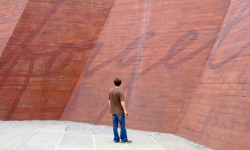
“Holy, holy, holy is the Lord.” How do you respond to these six words? Alan Burnett reflects on our response to the beauty of God.
“Holy, holy, holy is the Lord.” In these six simple words, we have revealed to us the cornerstone of heavenly worship, of what worship at the feet of the Lord looks and sounds like.
These are words revealed to us in two instances. The first is in the prophetic writings of Isaiah as the prophet details a vision of the Lord, high and exalted, being worshipped by seraphim in the heavenly court (Isaiah 6). The second is in the book of the Revelation of John, where a very similar scene is witnessed and reported (Revelation 4). As with Isaiah, John is called into the heavenly realm and sees before him the throne of the Lord with creatures surrounding him. Again, those same six words are declared, “Holy, holy, holy is the Lord.” Reading it, one could almost believe that John and Isaiah witnessed the same moment—beside each other yet unaware due to the glory that was before them—but we will come to that later. In the first instance I wish to identify what these texts, and the revelation they provide us, say about worship.
Drawn to the beauty of the Godhead
If we are to take seriously the vision that both Isaiah and John share with us through Scripture, then we must also take seriously their clear description of worship. They show us that before all other things, true worship is the recognition and adoration of the beauty of God, a reality that can only lead us to fall to our knees.
For many this will not come as a surprise. In one way or another, it is the beauty and glory of God that brings us to worship. Through our experience of creation, of relationship, of love, but fundamentally through our experience of grace, we witness some measure of that glory and can do nothing other than praise God.
But does this adoration always find its way into the worship of our community’s life? If we, in all that we do as the people of God, could see the throne of God before us in all moments of our gathering—would it change how we practise things, how we treat the moment, and how we treat one another?
In human life, when we encounter beauty we honour it by recreating it. In the world of art this is particularly true. When an artist encounters a glorious vista, they begin to copy it, trying to capture some essence of its beauty to share with others. When that same artist finds a beautiful person they do much the same, feeling that they cannot see this alone and honour it—such a beauty must be shared by all.
Do we as the church really try to replicate, depict, and express the beauty of God in our life together? Or do we primarily try to reach a demographic, cater to a niche, or hit the nerve of potential converts?
That is not to say that sensitivity to those things is not important, but it is to say that at the heart of our worship and our community resides the glorious throne of the Lord—not the angels, not the prophets, and not the people who worship him. Our communities are called to be a beautiful expression that captures something of the glory of God, and our worship, like the moon to the sun, is called to reflect that glory to those in the darkness.
Worship that was, and is, and is to come
I mentioned earlier that the similarity between the visions expressed by the Prophet Isaiah and John of Patmos could lead to the idea that they were in fact in the same moment at the same time.
The biblical scholar in me would likely argue that John deliberately alluded to Isaiah in his writings, and through the placement of the 24 elders, who could be martyred Christians, offers hope to his fellow Christians who may have been facing persecution. (This extends on work by Simon Woodman, who argues to identify the elders as the church, but also throughout his book notes the importance for John of recognising them as martyrs as he was writing to churches where some had died for their faith.)1
However, the reality still stands that this is an image God gave to John and so we must look beyond the convenience of authorial intent to a spiritual truth that may lie behind it. In this case I believe we are called to see the untiring reality of heavenly worship, but also that heavenly worship is forever only a moment—a moment we also join every time we worship.2 Let me explain.
Heavenly existence is something that is outside of time and space. It exists in a dimension that is timeless and eternal, never starting and never‑ending. For the human brain, this is incredibly hard to digest. Our linear brains trap us in time, but heaven dwells outside of it.
To accept this means that, for heaven, our yesterday is not chronologically different from our tomorrow; our eighth century BC is no different to our first century AD.
This would suggest that our centuries of worship, our countless Sundays, our multiple moments of praise and thanksgiving, are to heaven only ever one moment!
The profound nature of this rests not so much in that information, but in what follows from it. It means that in every moment of worship our voices join with the voices of those seraphim loudly exclaiming, “Holy, holy, holy is the Lord.” It means our offering of praise and treasure is matched by the casting forward of the crowns from the 24 elders. And it means that our moments of revelation are matched by the overwhelming sight the prophets experienced standing before the throne.
That is all well and good, you may say, but what does it change? In honesty, not a lot. However, it should deepen our experience of worship if for no other reason than that it brings our hearts rest to know that when a choir or a singer can’t quite hit a note, or a pastor can’t quite say a prayer, the angels in heaven sing just a little louder.
Broken things for broken people; holy things for holy people
Isaiah’s response to the worship of the seraphim and the presence of God was to be made aware of his own lack of holiness. To be given an audience by God is an overwhelming reality, but as the church it is one we often take lightly. A reality and knowledge that should bring us to our knees, often does not impact us deeply.
We who are blessed to join in the worship of a God who is eternally worshipped by angels and archangels and all the company of heaven, often have the audacity to boast how our worship is better than another kind or that of another church. We who have met the beauty of the Lord in grace, arrogantly declare that we are the holders of all truth and have contained this God, whose robe could fill the temple, to the exclusion of other brothers and sisters.
In six simple words from Isaiah and John of Patmos we have the reset button to our frustrations, our weariness, and our judgements. As we share in the worship of the apostles and prophets, of the angels and archangels and all the company of heaven, let the acclamation “Holy, holy, holy is the Lord” ring clearly in your spirit; let it transport you above the brokenness of our human fellowship to the place that God calls us—the throne room of heaven.
For all its brokenness, its messiness, and its frustrations, the church shares in a glory that is unsurpassed in the world and that goes beyond any one fellowship, any one church, and even any one time, to that which is at the centre of all true existence—the eternal worship of the triune God.
Story: Alan Burnett
The Reverend Alan is the chaplain at Hereworth School.
This article was first published as ‘A Glorious Mess’ in the Baptist v.132 no.5 October/November 2016 (7-9).
References:
- Simon Woodman, The Book of Revelation (London: SCM Press, 2008), 95.
- Adrian Langdon, God the Eternal Contemporary: Trinity, Eternity, and Time in Karl Barth (Eugene: Wipf & Stock, 2012), 107-108.
Scripture: Unless otherwise specified, Scripture quotations are from New Revised Standard Version Bible, copyright ©1989 National Council of the Churches of Christ in the United States of America. Used by permission. All rights reserved.


